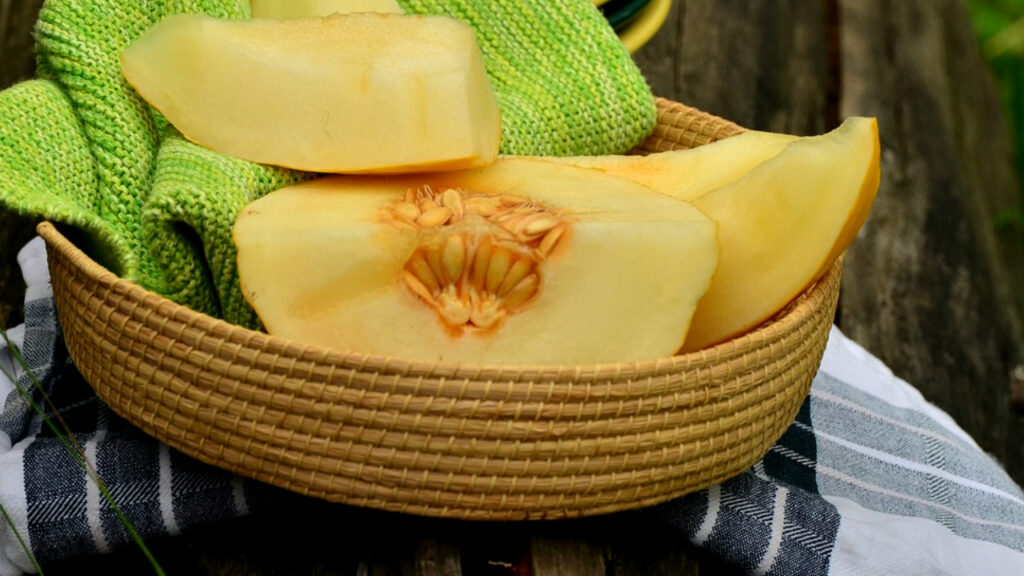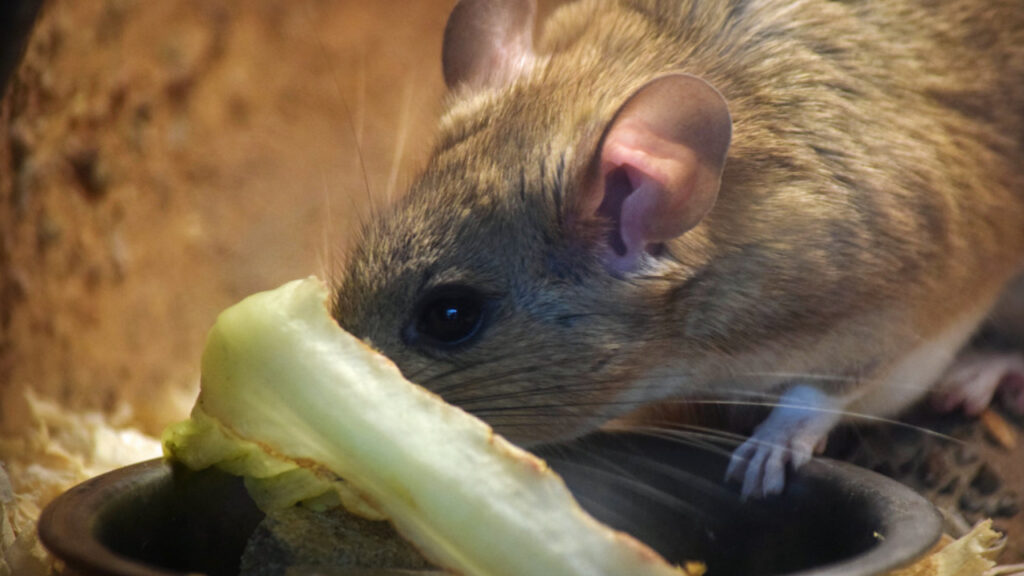
Honeydew is a type of melon known for its sweet and juicy flesh. It belongs to the Cucurbitaceae family, which also includes cucumbers and pumpkins. The honeydew melon has a smooth, pale green to yellowish skin and tender, pale green flesh.
But can rats eat them too?
Yes, rats can eat honeydew. Rats can enjoy small, bite-sized pieces of honeydew as a treat. The fruit is not only safe for them, but it also provides some hydration due to its high water content. However, it’s important to offer honeydew in moderation, as rats have small digestive systems, and excessive consumption of any treat, including fruits, can lead to health issues.
So, should you feed honeydew to your rats?
Let’s find out!
Table of Contents
Can Rats Have Honeydew?
Rats can indeed enjoy a little bit of honeydew!
Honeydew is a yummy fruit, kind of like a greenish melon.
Rats can munch on it because it’s not harmful to them. Just remember, though, even though rats can eat honeydew, it’s important to give it to them in small pieces.
Rats have tiny tummies, and too much of anything can be a bit too heavy for them.
So, if you want to treat your rat to a fruity snack, go ahead and share a small piece of honeydew with them.
They might nibble on it happily! Just be sure not to give them too much, and you’ll have one content little rat friend.
You may like: Can Rats Eat Mushrooms?
Is Honeydew Good for Rats?

Honeydew can be a good addition to a rat’s diet when offered in moderation.
It comes with several health benefits!
For example, a typical serving of honeydew (100g) contains:
- Calories: 36 kcal
- Water Content: 90%
- Carbohydrates: 9.1 g
- Sugars: 8.1 g
- Dietary Fiber: 0.8 g
- Protein: 0.5 g
Other benefits of honeydew may include:
Hydration
Honeydew has a high water content, helping to keep rats hydrated.
Proper hydration is essential for overall health and well-being.
Vitamins and Minerals
Honeydew is a source of essential vitamins and minerals, including vitamin C, potassium, and folate.
These nutrients play a role in immune function, bone health, and overall vitality.
Antioxidants
The fruit contains antioxidants that can help protect cells from damage caused by free radicals.
Antioxidants contribute to the overall health and longevity of rats.
Fiber Content
Honeydew contains dietary fiber, which can aid in digestion and contribute to a healthy gastrointestinal tract.
Risks of Overfeeding Honeydew to Rats
While honeydew can be a tasty and safe treat for rats when given in moderation, overfeeding can pose some risks.
Here are the potential risks of overfeeding honeydew to rats:
Obesity
Honeydew, like many fruits, contains natural sugars.
Overfeeding can lead to an excess intake of calories, contributing to weight gain and potentially leading to obesity.
Rats, like humans, can face health issues when carrying excess weight.
Digestive Upset
Rats have sensitive digestive systems.
Feeding them too much honeydew at once may cause digestive upset, leading to diarrhea or stomach discomfort.
It’s essential to introduce new foods gradually to allow their systems to adjust.
Dental Issues
Fruits like honeydew are sweet and can contribute to dental problems if overfed.
The natural sugars may promote the growth of harmful bacteria in the mouth, potentially leading to dental issues.
Regular dental care and a balanced diet help mitigate this risk.
Thus, make sure to offer honeydew and other treats in moderation and as part of a well-balanced diet.
Pay attention to their reactions and adjust their diet accordingly to keep them happy and healthy.
How Much Honeydew Can be Given to Rats?
When it comes to giving honeydew to your rat friend, it’s all about moderation.
Think of it like sharing a treat – a little is good, but too much might not be the best idea.

For a small pet rat, a teaspoon-sized amount of honeydew is usually a good starting point. You can cut it into tiny pieces or cubes so it’s easy for them to nibble on.
Rats have tiny tummies, so giving them small portions helps prevent overeating.
As a rule of thumb, treats like honeydew should make up only a small part of their diet. Most of their food should be a balanced rat food to keep them healthy.
Also, keep an eye on how your rat reacts to new foods. If they enjoy it and it doesn’t upset their tummy, great!
If not, it’s okay – not all rats have the same taste preferences.
Can Baby Rats Eat Honeydew?
Just like adult rats, baby rats, or rat pups, can enjoy a bit of honeydew as part of their diet.
However, there are a couple of things to keep in mind.
Firstly, baby rats have tiny tummies, and their digestive systems are still developing.
So, when you offer honeydew to baby rats, it’s crucial to cut it into really small, manageable pieces. Think of it as making rat-sized melon cubes!
Secondly, while it’s okay to give them a little taste, the majority of their diet should still come from a specially formulated rat food. This food is designed to provide all the nutrients baby rats need to grow into healthy adults.
As a general guideline, you can start introducing small pieces of honeydew to baby rats once they’re about three weeks old.
But always pay attention to how they react. If they seem to enjoy it and it doesn’t cause any tummy troubles, you’re on the right track!
Can Rats Eat Other Types of Melons?
Rats can enjoy a variety of melons, and it can be a tasty and refreshing addition to their diet.
Here are a few types of melons that are generally safe for rats:
- Cantaloupe: Rats can eat cantaloupe. Just like honeydew, it’s a good idea to cut it into small, bite-sized pieces to make it easier for them to eat.
- Watermelon: Watermelon is safe for rats in moderation. Remove the seeds and the rind, and offer them the fleshy part. It’s a hydrating option for them.
- Seedless varieties: Opt for seedless varieties when possible. Seeds can be a choking hazard, so it’s safer to choose melons without seeds or remove them before offering the fruit to your rats.
As always, when introducing new foods to your rats, start with small amounts to see how they react. If they enjoy the melon and it doesn’t cause any digestive issues, you can continue to include it in their diet as an occasional treat.
Here is a cute video of rats trying different foods:
Preparing Honeydew for Pet Rats
Preparing honeydew for your pet rats is a straightforward process.
Here’s a simple guide to help you:
- Choose a Ripe Honeydew: Pick a honeydew that is ripe and sweet. Rats, like us, enjoy the tastiest parts of the fruit.
- Wash the Honeydew: Rinse the honeydew thoroughly under cold water. This helps remove any dirt or pesticides that might be on the skin.
- Cut into Small Pieces: Use a clean knife and cutting board to cut the honeydew into small, rat-sized pieces. Rats have tiny mouths, so smaller pieces are easier for them to handle and eat.
- Remove Seeds and Rind: If the honeydew has seeds, scoop them out. Rats may have difficulty with seeds, and they can be a choking hazard. Also, remove the outer rind, as it may be tough for them to chew.
- Serve in Moderation: Offer the prepared honeydew to your rats in moderation. A teaspoon-sized portion is a good starting point. Remember, treats like honeydew should complement their regular diet, not replace it.
Remember, variety is key in a rat’s diet. While honeydew can be a tasty treat, ensure that the majority of their nutrition comes from a balanced rat food.
This way, you’re helping to keep your rat happy and healthy!
Alternatives to Honeydew for Rats
Rats can enjoy a variety of fruits and vegetables as part of a balanced diet.
Here are some alternatives to honeydew that you can consider offering to your pet rats:
- Apples: Remove the seeds and core, and cut the apple into small, bite-sized pieces.
- Bananas: Peel the banana and slice it into small rounds. Bananas are a favorite among many rats.
- Berries (Strawberries, Blueberries, Raspberries): Offer these in moderation. Berries are rich in antioxidants and make for a tasty and healthy treat.
- Grapes: Cut grapes into halves or quarters to prevent choking. Grapes are sweet and hydrating.
- Pears: Remove the seeds and core, and cut the pear into small pieces. Pears provide a different flavor for variety.
- Peaches: Remove the pit and slice these fruits into small, manageable pieces.
- Cucumber: Slice cucumber into thin rounds. It’s a hydrating and low-calorie option.
- Bell Peppers: Remove seeds and membranes, then chop into small pieces. Bell peppers provide vitamin C.
Remember to introduce new foods gradually and in small amounts to ensure your rats tolerate them well.
Also, always remove any seeds or pits, as they can pose a choking hazard.
These alternatives provide variety and nutrition for your rats, making their diet more interesting and well-rounded.
Final Thoughts
To sum up, rats can indeed enjoy honeydew as a tasty and safe treat.
When sharing this sweet melon with your furry friends, remember a few key points:
- Offer honeydew in small, rat-sized portions. Rats have tiny tummies, and a little goes a long way.
- Wash the honeydew, cut it into small pieces, and remove seeds and rind. This makes it easier for your rats to eat and minimizes choking hazards.
- Pay attention to your rats’ reactions when introducing new foods. If they enjoy the honeydew and it doesn’t cause any digestive issues, you’re on the right track.
While honeydew is a delightful option, it’s just one of many fruits you can offer. Variety is essential, and fruits should be a supplement to their main diet of balanced rat food.
Before you leave, here are more helpful articles
